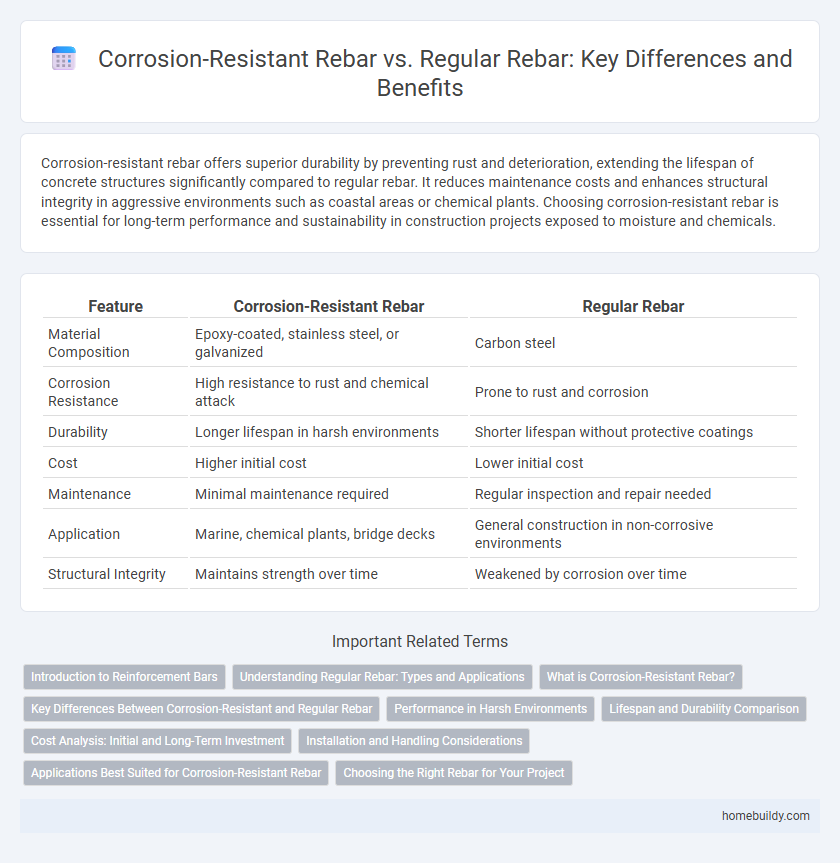Corrosion-resistant rebar offers superior durability by preventing rust and deterioration, extending the lifespan of concrete structures significantly compared to regular rebar. It reduces maintenance costs and enhances structural integrity in aggressive environments such as coastal areas or chemical plants. Choosing corrosion-resistant rebar is essential for long-term performance and sustainability in construction projects exposed to moisture and chemicals.
Table of Comparison
| Feature | Corrosion-Resistant Rebar | Regular Rebar |
|---|---|---|
| Material Composition | Epoxy-coated, stainless steel, or galvanized | Carbon steel |
| Corrosion Resistance | High resistance to rust and chemical attack | Prone to rust and corrosion |
| Durability | Longer lifespan in harsh environments | Shorter lifespan without protective coatings |
| Cost | Higher initial cost | Lower initial cost |
| Maintenance | Minimal maintenance required | Regular inspection and repair needed |
| Application | Marine, chemical plants, bridge decks | General construction in non-corrosive environments |
| Structural Integrity | Maintains strength over time | Weakened by corrosion over time |
Introduction to Reinforcement Bars
Corrosion-resistant rebar, often made from epoxy-coated, stainless steel, or galvanized materials, offers enhanced durability and longevity compared to regular carbon steel reinforcement bars. These specialized rebars significantly reduce the risk of structural damage caused by rust and corrosion, particularly in harsh environments exposed to moisture and chlorides. Investing in corrosion-resistant reinforcement bars ensures improved structural integrity and lower maintenance costs in concrete construction projects.
Understanding Regular Rebar: Types and Applications
Regular rebar, typically made from carbon steel, includes varieties such as carbon-steel rebar, epoxy-coated rebar, and galvanized rebar, each suited for specific construction needs. Regular carbon-steel rebar is widely used in concrete structures for its high tensile strength but is susceptible to corrosion in moist or saline environments. Applications range from residential foundations and bridges to commercial buildings, where environmental exposure dictates the choice between standard and corrosion-resistant options.
What is Corrosion-Resistant Rebar?
Corrosion-resistant rebar is a type of reinforcement bar specifically engineered to withstand chemical and environmental factors that induce rust and structural degradation, typically made from materials such as stainless steel or epoxy-coated steel. Unlike regular rebar, which is prone to corrosion when exposed to moisture and chlorides, corrosion-resistant rebar extends the longevity and durability of concrete structures, particularly in marine or deicing salt environments. This advanced rebar improves structural integrity by preventing rust-related expansion that causes concrete cracking and spalling.
Key Differences Between Corrosion-Resistant and Regular Rebar
Corrosion-resistant rebar, often made from epoxy-coated steel or stainless steel, offers enhanced durability by preventing rust and extending the lifespan of concrete structures, unlike regular rebar which is more prone to corrosion when exposed to moisture and chlorides. Key differences include material composition, with corrosion-resistant rebar utilizing protective coatings or alloys to inhibit oxidation, and the cost-effectiveness, as corrosion-resistant options typically involve higher initial investment but reduce long-term maintenance expenses. Performance in aggressive environments, such as marine or de-icing salt exposure, highlights corrosion-resistant rebar's superior resistance, ensuring structural integrity and safety over time compared to standard carbon steel rebar.
Performance in Harsh Environments
Corrosion-resistant rebar, often made from stainless steel or epoxy-coated steel, significantly outperforms regular rebar in harsh environments by maintaining structural integrity and reducing maintenance costs over time. Its superior resistance to chloride ions and moisture prevents rust formation, which is critical in marine, coastal, and de-icing salt-exposed infrastructure. Regular rebar, prone to corrosion under similar conditions, can compromise concrete durability and lead to premature structural failure.
Lifespan and Durability Comparison
Corrosion-resistant rebar, typically made from epoxy-coated, stainless steel, or galvanized steel, significantly extends the lifespan of concrete structures by preventing rust and reducing structural degradation, often lasting 50 years or more under harsh environmental conditions. Regular rebar, primarily composed of carbon steel, is prone to corrosion when exposed to moisture and chlorides, which can lead to spalling and reduced structural integrity within 10 to 20 years. The enhanced durability of corrosion-resistant rebar minimizes maintenance costs and ensures longer-lasting performance in marine, industrial, and high-humidity environments.
Cost Analysis: Initial and Long-Term Investment
Corrosion-resistant rebar typically incurs a higher initial cost than regular rebar due to advanced materials like epoxy coatings or stainless steel compositions enhancing durability. Over the long term, this investment reduces maintenance expenses and extends the lifespan of concrete structures by minimizing corrosion-related damages. When factoring lifecycle costs, corrosion-resistant rebar offers greater economic value, especially in environments prone to moisture, chlorides, or chemical exposure.
Installation and Handling Considerations
Corrosion-resistant rebar requires careful handling to avoid damaging its protective coating, which can be compromised by bending or cutting, unlike regular rebar that is more tolerant to on-site modifications. Installation of corrosion-resistant rebar demands precise placement and limited mechanical impact to maintain its durability in harsh environments, reducing long-term maintenance costs. Proper training for workers on handling techniques ensures the rebar's corrosion resistance integrity, enhancing the lifespan of concrete structures exposed to moisture and salt.
Applications Best Suited for Corrosion-Resistant Rebar
Corrosion-resistant rebar is best suited for applications exposed to harsh environments such as marine structures, bridges, and parking garages where chloride exposure and moisture accelerate corrosion. Its use extends to concrete foundations and retaining walls in coastal and industrial areas, ensuring longevity by preventing rust-related concrete damage. Compared to regular rebar, corrosion-resistant rebar significantly enhances structural durability and reduces maintenance costs in aggressive environmental conditions.
Choosing the Right Rebar for Your Project
Corrosion-resistant rebar, typically made from epoxy-coated or stainless steel, offers superior durability and longevity in environments exposed to moisture, salt, or chemicals, reducing maintenance costs and structural damage over time. Regular rebar, usually carbon steel, is more economical but prone to rust and corrosion, which can compromise structural integrity in harsh conditions. Selecting corrosion-resistant rebar ensures enhanced protection and extended lifespan for infrastructure projects exposed to aggressive environments, while regular rebar remains suitable for dry, non-corrosive settings to optimize budget efficiency.
Corrosion-resistant rebar vs Regular rebar Infographic

 homebuildy.com
homebuildy.com